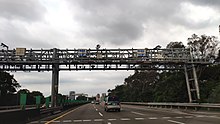

Open road tolling (ORT), also called all-electronic tolling, cashless tolling, or free-flow tolling, is the collection of tolls on toll roads without the use of toll booths. An electronic toll collection system is usually used instead. The major advantage to ORT is that users are able to drive through the toll plaza at highway speeds without having to slow down to pay the toll. In some installations, ORT may also reduce congestion at the plazas by allowing more vehicles per hour/per lane.
The disadvantage to ORT is that it relies on the honor system to the extent that without the presence of toll booths there is typically no physical means of preventing drivers who have no intention of paying the toll from accessing the road. Toll operators refer to such toll evasion as "leakage." To deter such behavior, toll operators can employ tools such as high-definition cameras to identify violators, and leakage can be offset in part or whole by fees and fines collected against offenders. However, in many cases such enforcement is relatively limited (for example, targeting only commercial vehicles and other such flagrant and/or repeat offenders). Some toll operators prefer to simply write off leakage as an expense, especially if the costs associated with collection efforts are expected to exceed the additional tolls, fees and/or fines that will likely be collected, or alternatively allow vehicles that are privately operated and/or below a specified size and/or weight to access the toll road free of charge.[citation needed]